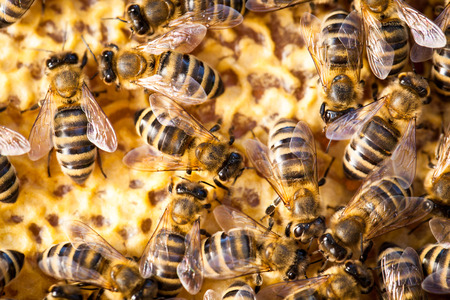Detroit Honey Bees Get a Helping Hand
July 09, 2020
Bees in the D is helping honey bees thrive in Detroit.
With death rates in recent years having grown to the point some believe honey bees could become extinct very soon if we don’t do something, it is nice to see that some Detroit beekeepers are getting a boost from a non-profit group called Bees in the D. The group started with less than 10 hives in the area and now boasts managing more than 175 hives in six counties and over 50 different locations.
Bees in the D is a true team operation, with cooperation being enlisted from major businesses in the area to local scout troops. Sterling Height is a perfect example of how well these partnerships are working to help the honey bee population in Detroit thrive. Bees in the D partnered up with four different groups to place hives at Fiat Chrysler Automobiles (FCA). An ideal setting was found at the facility where two hives were placed. Brian Peterson-Roest, the founder of Bees in the D, stated, “The hives are looking amazing. That cold spell at the end of May slowed them down but the rain we got [in June] will help, it was getting pretty dry.”
As you may or may not know, honey bees are not native to this part of the country, but they have become an integral part of our agricultural world. Colony Collapse Disorder (CCD), while being downplayed by some, is a very real threat to the future of honey bees in this country. In addition to the usual deaths hives experience over the course of a winter, CCD and other factors have contributed to a significant decline of the honey bee population in this country. In fact, the honey bee population has shrunk by nearly 50 percent since 1947.
Right or wrong, we have included numerous different factors to CCD. The accepted contributors to CCD are pathogens, pesticides, and the Varroa mite. In recent years, however, many of us have included other factors, such as loss of habitat and beekeeping practices. For instance, we have seen numerous studies (several of them discussed on our blog) that show manmade hives could be partly to blame for the winter losses we have seen climb in recent years.
Peterson-Roest touched on this subject briefly in a recent interview. He stated, “Pesticides, herbicides, fungicides can be a problem—they are designed to kill insects harmful to crops but can kill those that are beneficial. Habitat is another issue, urban sprawl takes land but also we've also created a monoculture where fields are miles and miles of corn, or one type of plant that doesn't allow for the diversity pollinators need.” He added, “Because we have become a global society, Varroa mites and other diseases can spread quickly. They have devastated hives across the world and it’s worse in the winter, a typically stressful time for bees.”
Bees in the D is now expanding its operation to include education. The group is hoping to build a community education center on what is currently a vacant lot in downtown Detroit. Peterson-Roest stated, “We want it to be a place where people can go to learn, with rooftop hives, but also a community center for functions.”
To learn more about Bees in the D, click here.
Source: Second Wave Media


.jpg)



